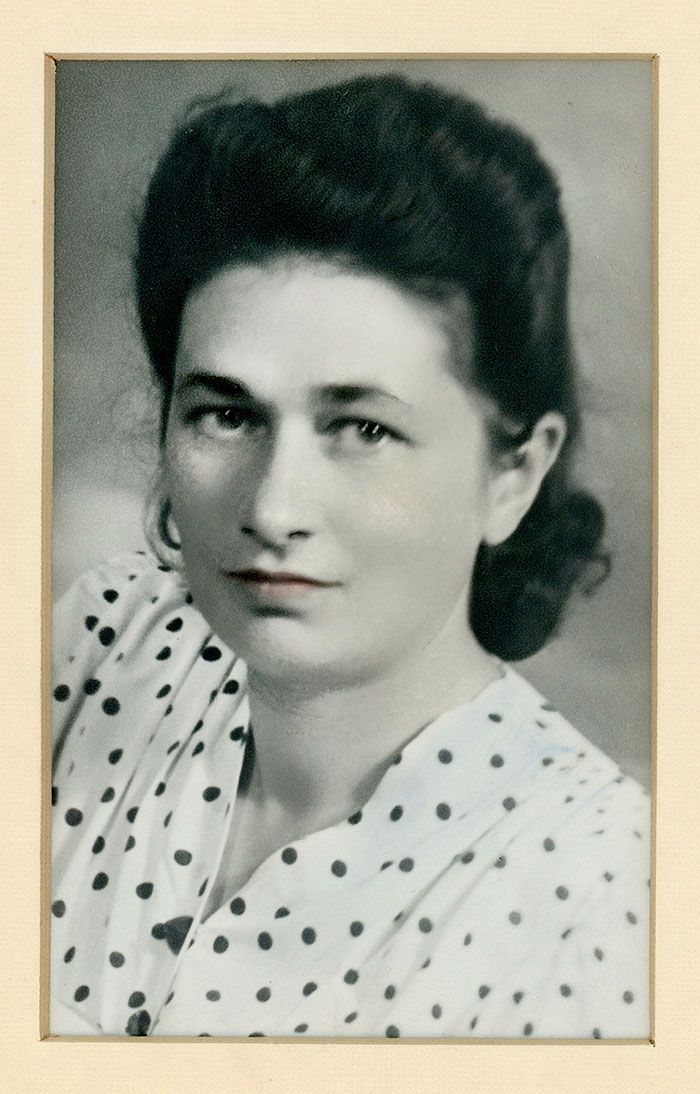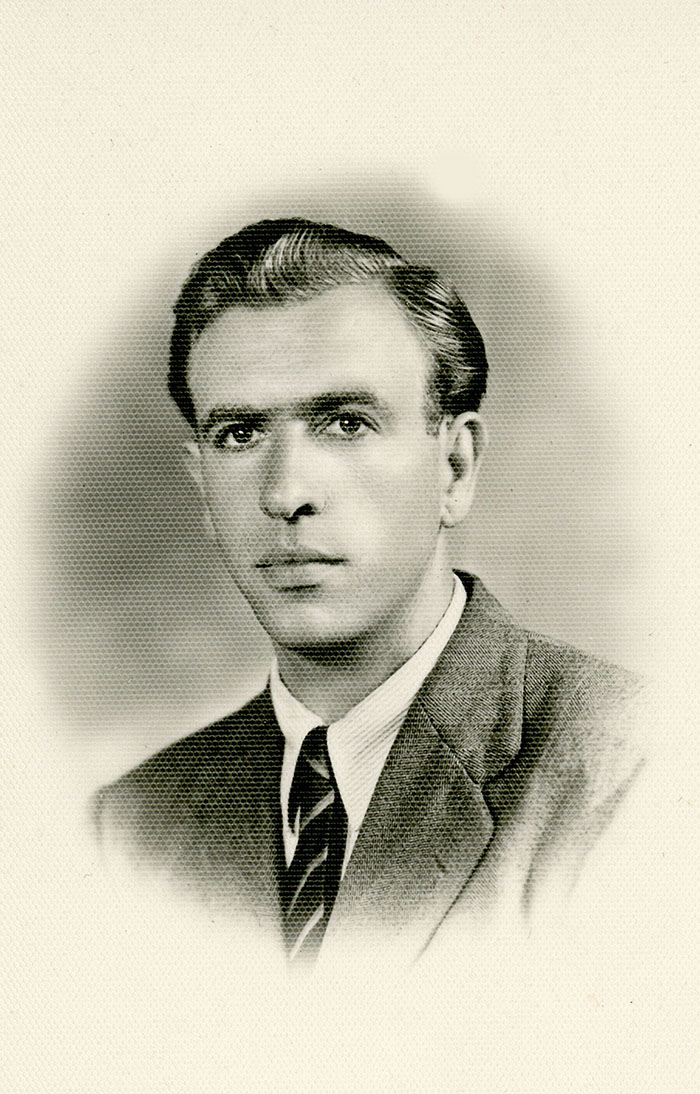Name: Joshua Kobryn and Liwa Leczyca
Birth: Joshua – 2/10/1919; Liwa – 10/8/1916
Birthplace: Poland
Death: Joshua – 1/3/2016; Liwa – 11/24/2009
Connected to: Ivy and Sophie SILVERBERG, Class of 2027
Connection:Maternal Great-Grandfather and Great-Grandmother
This story is about Liwa and Joshua, Holocaust survivors, told in their son’s voice (our maternal grandfather).
Growing up in Toronto with my older brother and parents in the early 1950s, I felt loved and protected. As a friendly child, I met and played with the other children in our neighbourhood of Kensington Market. I was curious about the fact that my playmates had relatives beyond their immediate family. They had grandparents, cousins, aunts and uncles. But we had none. When I asked my parents about this, they tried to gently inform me that all of those relatives of ours were killed in the Holocaust during the
Second World War before I was born. “But if they were not soldiers, why were they killed?” I asked. “Because they were Jewish,” was the answer. Now in my 70s, I still have difficulty understanding the sometimes murderous hatred of antisemitism.
Liwa, my mother, was the oldest of three children living in a medium-sized town in western Poland. She had a younger brother, Joseph, and a sister named Luna. She was a good student and was on track to become a lawyer. They had comfortable, middle class lives. Her father was a chemist who had a small soap factory. They could afford to have a cook, which was the excuse my mother gave me for never mastering culinary skills. Because of the history of European antisemitism, they tried moving around 1930 to what is now Israel but then was the British Mandate of Palestine. Unfortunately, the primitive conditions in the Tel Aviv area were too harsh for her mother, so after two years they made the fatal error of returning to Poland.
Joshua, my father, was the oldest of two children living in a small city in eastern Poland. He had a younger sister, Nachama. He lived with his parents and extended family above the grain wholesale business that sustained them. His mother minded the store so that his religious father could study the Torah and look after the local synagogue. Joshua had athletic talent and was mildly rebellious. His passion was soccer. He played for the local team despite his parents disapproval because that was not something that “good boys” did in their culture.
Gradually during the 1930s, dark social and political clouds formed over Europe and in particular Poland. Adolph Hitler rose to power in Germany. He fanned the flames of militarism and antisemitism. In 1939, with the help of their Russian allies under Stalin, Germany attacked and quickly conquered Poland.
Liwa was in the part of Poland that the Germans took. Jews were attacked, forced from their homes and gathered into concentration camps so they could be slaughtered on an industrial scale. Liwa’s father, who was a community leader, was killed in the first few days. The rest of her family died shortly after, along with six million European Jews. Liwa was able to escape that fate by disguising herself as a non-Jew. She spent the next six years of the war, until 1945, in a slave labour/concentration camp fearing each day that someone who knew her would recognize her identity and she would be killed. She worked producing munitions for the German war machine which she tried to sabotage but was never caught.Against all odds, she survived to escape the camp in the final days of the war as the Nazi regime crumbled.
Joshua lived in the eastern part of Poland that the Russians invaded when war broke out. Although also antisemitic, the Russians did not have the same murderous plan to kill the Jews. Joshua left his home town with two friends to try to make their way through eastern Europe and Russia to safety. His family stayed behind and he never saw them alive again. The Germans launched a surprise attack on the Russians in 1942 and then rounded up and killed as many of the Jews in eastern Poland as they could. Joshua survived through luck, determination and his affable personality. He had an amazing series of adventures as he took a variety of jobs working his way across Russia. He was a woodworker, horse wrangler, ship’s helmsman and farm hand. He was once mistakenly arrested and almost shot as a spy. Life was very precarious. He had his shoes stolen from under his head (he was protecting them by using them as a pillow) while he slept on the floor of a train station. His vague plan was to travel to Persia and then try to get to Palestine. Unfortunately, by the time he got there, alone and separated from his friends, the border was sealed and he could not cross. The only way to get back to Europe was to join the Russian army which by this point in the war was forcing the Germans back. He thought the war might be over given the time it would take for basic training and transportation west. He miscalculated, arriving at the front with almost a year remaining in the war. Once again his luck held and his wits served him well. Armed with a machine gun, this sergeant in a commando company of 90 men was one of the few unscathed survivors by the end of the war. The Germans were finally defeated in 1945.
When the war was over, Europe lay in ruins. Liwa and Joshua, both sole survivors of their families, met, fell in love and married. They were both physically unharmed but the lifelong work of recovering psychologically, socially and spiritually was just beginning. Having no homes or country to return to, they were assisted by a Jewish refugee organization whose goal was to help them travel to the only place in the world that they might be safe:Palestine, yet to become Israel. They were smuggled without documents across European borders and crossed the Alps on foot while Liwa was pregnant with their first child, my older brother. They got to Italy but the British were blockading Mediterranean shipping to halt immigration to Palestine. For the next 18 months they lived in a refugee camp outside of Rome and formed a new social network with other families in similar circumstances. These other survivors along with their children would become my ‘pretend’ extended family in Canada and the United States. In 1948, under the direction of the United Nations, Israel became an independent country but was immediately attacked by its neighbours. My parents who had just survived one war were not keen on jumping into another one with their newborn son. The opportunity arose to immigrate to Canada and although unable to speak English,having no marketable skills nor knowing anyone, they decided to chance it.
Arriving in this marvellous country of Canada, with work and perseverance they were able to rebuild their lives, dreams and family. Together with my lovely wife, we now have four wonderful children who are married to wonderful people, and nine grandchildren, two of whom are lucky enough to be enrolled in The Bishop Strachan School.
We Remember Joshua and Liwa
Epitaph/Memorial
Exalted and hallowed be God’s great name
in the world which God created, according to plan.
May God’s majesty be revealed in the days of our lifetime
and the life of all Israel — speedily, imminently,
To which we say: Amen.
Mourner’s Kaddish



